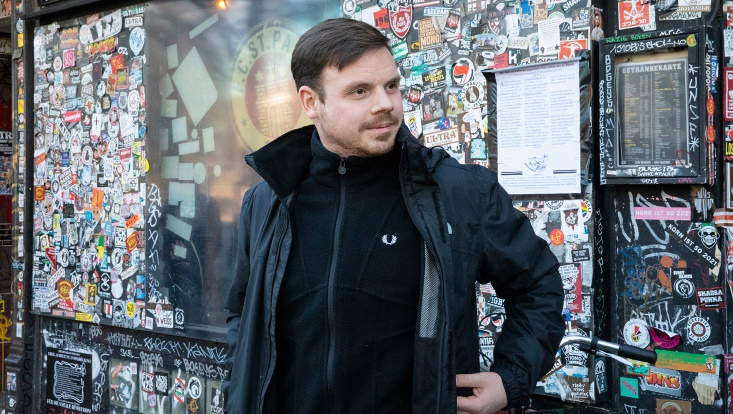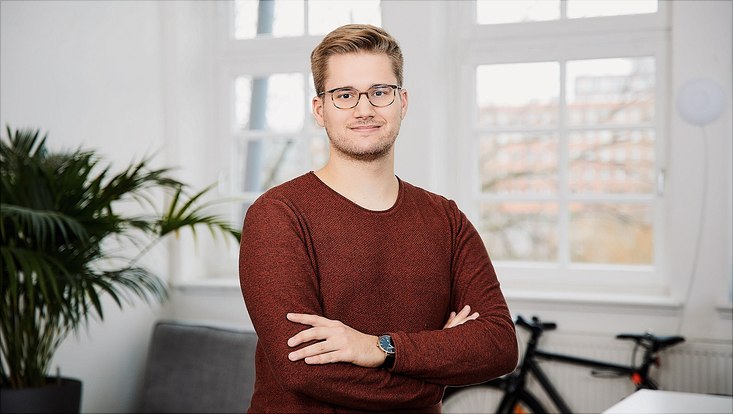Countering commercializationCommunity-Owned Sports Clubs and Democracy-BuildingTitles, topics, doctoral theses
17 July 2023, by Markus Friederici

Photo: Private
Sports clubs can be an important place for children and adolescents to participate. For his doctoral thesis, Fabian Fritz, from the social work subject group, is taking a closer look at English soccer clubs that are democratically organized and researching how they cultivate democracy. The interview below is part of our Junge Forschung series in the Faculty of Education.
What is the focus of your work?
In my dissertation, I am looking at a very specific type of English sports club and its potential for cultivating democracy among children and adolescents.
I am looking at 8 so-called “community-owned sports clubs” (COSCs) and their youth outreach. COSCs are soccer clubs founded by fans due to spreading commercialization. For example, former fans of Manchester United FC set up their own club, the FC United of Manchester.
These roughly 50 soccer clubs in England are democratically organized, contrary to other soccer clubs, are strongly oriented towards German clubs, and have numerous children and adolescents as members. During my stay in the United Kingdom, I surveyed coaches and children and adolescents from 8 clubs regarding their democratic participation and I analyzed how they could practice democracy. In brief: I looked at democracy-building via democratic praxis.
What were your findings?
These sports clubs, in contrast to those run privately as corporate enterprises, have great potential for democracy-building. However, this varies depending on the roles that the children and adolescents play in the clubs.
While top athletes and mass sports athletes have little input, young fan members are well-integrated in club democracy.
Nonetheless, these clubs often find it difficult handing over responsibility to young people because interestingly, these clubs do not comprehensively target their own members in their youth outreach but so-called “disadvantaged” youth outside the clubs. This is ascribed mainly to alleged deficits and thus these kids have little to no say because they are not entrusted with one. As important as the opportunities are, for example help with homework or street soccer—the clubs are thus not really comprehensively tapping into the full potential for democracy-building.
What is the practical relevance of your findings?
Because I was doing research participatively, the clubs were able to contribute their own questions from the outset. Thus, ultimately, they can also continue to use the material that we gathered together.
Concretely, that means that, following my interviews, the findings were validated with the same interview partners. This made it clear that my work inspired greater democratization of child and youth outreach in some of the clubs. Unfortunately, the corona pandemic put a stop to things so I could not continue to work with all of the clubs. Still, other important processes were set into motion.
What is the quintessence of your work?
Ultimately, these clubs stand for the democratization of thoroughly commercialized (professional) soccer and they lend hope that democratic clubs might tame capitalism. The fact that these clubs are tightly interwoven with their communities underscores how important communal settings are for democracy.
However, it also became clear how difficult it is for these clubs to maintain their utopias in an otherwise extremely commercial environment created by other clubs. Ultimately, some of the clubs even gave up on their democratic organizations to sell them to investors while I was doing my surveys.
About
Fabian Fritz is doing his doctorate in social work at the Faculty of Education. He is also a research associate at the University of Siegen, an adjunct lecturer at the HAW Hamburg, and youth education consultant at the museum for the FC St. Pauli soccer club. His focus areas are democracy-building, child and youth work, and sports clubs.
Junge Forschung series, Faculty of Education
What are young educators actually working on? And where can they contribute their research findings practically? In the Junge Forschung series, the faculty introduces its young researchers and their work in interviews with the head of the graduate school, Dr. Markus Friederici.


